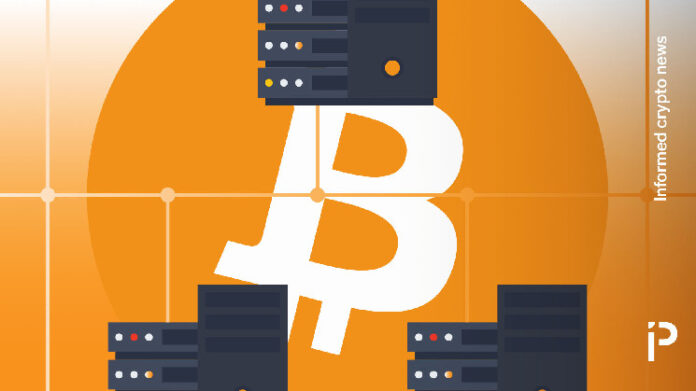Operators of the world’s largest bitcoin (BTC) mining swimming pools are quietly discussing an issue with BTC payouts. Regardless of mining BTC, securing BTC, and incomes 100% of their income in BTC, pool operators are sometimes discovering the forex itself to be cumbersome for paying their very own staff.
Though all main BTC mining swimming pools pay for work in BTC at the moment, just a few are warming as much as the concept of an altcoin as a superior fee technique.
For months, builders and pool managers have engaged in deep discussions on technical boards like Delving Bitcoin round digital money (“ecash”) token alternate options to mining pool payouts. One of many dialogue leaders, vnprc, has proposed a brand new type of eHash tokens that characterize “liabilities” that may be “audited” utilizing a so-called “Proof-of-Liabilities” protocol by Calle.
The irony of such a string of phrases is obvious to any BTC maximalist: new token, new proof, and new protocol. BTC is meant to be the preeminent peer-to-peer digital money so why are builders busy inventing a brand new token to pay for pure BTC work?
How bitcoin is burdening mining pool payouts
Collaborating in a mining pool is often not so simple as contributing work and receiving a proportion of the coinbase reward and transaction charges at any time when your pool mines a block. (Bitcoin’s coinbase reward is at the moment 3.125 BTC per 10-minute block, or about $325,000.)
Sadly, pool operators face varied idiosyncrasies with calculating miners’ stage of computation, the pool’s prices since its final coinbase reward, and the inherent 10-minute transaction delays between Bitcoin blocks.
Altogether, these elements complicate an instantaneous BTC payout to pool members. Take into account the delays necessitated by pool payout constructions like PPLNS as an instance this frustration.
Learn extra: Bitcoin mining is tougher than ever
Inside some pool payout schemes like pay per final N shares (PPLNS), a member would possibly want to attend days or even weeks for the pool to search out extra blocks previous to receiving their first payout. Because the title suggests, pay solely happens for the final shares of labor that really earned cash for the pool.
Whereas the pool waits to win blocks, its miners should additionally patiently wait for his or her payouts.
Extremely variable transaction charges additionally imply that inexpensive BTC funds would possibly all of a sudden grow to be unaffordable relying on the whims of the market, spikes in transaction charges, or hour of the day.
Worse, the BTC denomination of mining work — which fluctuates quickly in USD value, in contrast to electrical energy — implies that swimming pools can sometimes allocate templated work to their members with an enormous BTC change in USD worth by the point the pool truly will get fortunate sufficient to win its coinbase reward.
Work for beneficiant ideas, win small ideas
The non-profit Bitcoin Optech illustrates this with an instance of a pool that instructs its members to mine a template that will be value 3.125 BTC coinbase plus an enormous amount of additional BTC value of transaction charges.
(Transaction charges are “ideas” from BTC customers to miners that incentivize inclusion of their transaction within the earliest block doable. It’s not remarkable for transaction charges to exceed 10X the worth of the coinbase reward.)
Suppose {that a} member contributes substantial work on this template, expending vitality and computation to hash 10% of that pool’s share of that block. That member may be hoping for 10% of that block’s, say, 30 or extra BTC — an amazing payday.
Then, infuriatingly, one other pool solves the mathematical puzzle for that very same block and wins all of its coinbase and transaction charges. Out of the blue, the member’s hoped-for 10% of 30 BTC is value $0.
Tragically, by the point that unique member and its pool lastly win their subsequent block, transaction charges have cratered and the block they really win is value simply 4 BTC — a far cry from 30.
On this case, many pool operators honor the unique work task based mostly on the previous template that was value 30 BTC and compensate staff from company reserves. (Over time, pool operators smoothe out payouts on this method to keep away from shedding their workforce to different, extra well-capitalized opponents.)
Nevertheless, this technique is unsustainable in the long run if the pool operator assigns high-fee, BTC-denominated work that fluctuates too typically to the draw back by the point the pool truly wins its blocks.
Engaged on ecash
One obvious answer to this downside is a non-BTC token that may take the type of a redeemable “share” of BTC pool payouts. This crypto asset spinoff would possibly take the type of a “PPLNS ecash share” that’s traded on a secondary market and is linked to the BTC held by pool operators.
Different proposals are additionally underway that supply options like sooner transaction instances, higher liquidity, financeability, and different worth propositions.
To be clear, these tokens aren’t supposed to be speculative belongings like memecoins or any kind of ICO, however reasonably easy tokens that permit pool members to redeem their share of labor earlier or sooner than BTC itself would permit.
Briefly, it’s ironic but fascinating that BTC itself is turning into an sometimes problematic fee technique inside Bitcoin’s personal business of mining. Energetic discussions are underway concerning doable tokens or iterations of ecash that may clear up payout considerations of pooled miners.

